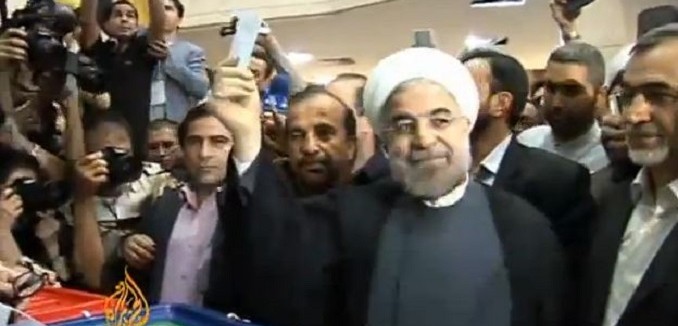Observers are expressing concerns over the past activities and future intentions of Iranian president-elect and revolutionary-era cleric Hassan Rouhani, who won Iran’s Friday election after a purge of candidates by the country’s powerful Guardian Council, coupled with a subsequent drop-out by another candidate, left him as the relatively most moderate candidate.
Though he had once called for the execution of pro-democracy protesters, Rouhani was nonetheless left as the least radical option for reform-minded voters, and his election has generated hope in some quarters that he might be able to facilitate talks with the West. A Wall Street Journal analysis published this morning, however, emphasizes that any change in Iran’s posture “would require a shift by Supreme Leader Ayatollah Ali Khamenei.”
The Islamic Republic’s overarching policies on matters such as its nuclear program, relations with the U.S. and its support of Syria’s regime are decided above the president’s level. Mr. Khamenei and his close circle of advisers typically decide the direction of these policies, and the president executes them.
The Supreme Leader had already explicitly forbidden the eventual winner from making concessions to the West, and the WSJ adds that “Mr. Khamenei has said over the past year that Iran would gain nothing by normalizing relations with the U.S.”
The utility of negotiations conducted by Rouhani is also being subjected to increasing scrutiny. Canadian MP Irwin Cotler gestured toward Rouhani’s boasts that he had used negotiations in order to provide the regime diplomatic space for expanding its nuclear program, emphasizing that “Ro[u]hani had patented the strategy of using negotiations – or negotiations about negotiations – as a cover for the uranium enrichment program.”
However, Rohani is the same person who struck a conciliatory posture as Iran’s top nuclear negotiator, under another reformist president, Mohammed Khatami, while presiding over the secret advance of the nuclear program. Rohani was the one who boasted that, even when Iran had suspended uranium enrichment, it was able to make its greatest nuclear advances, saying, “While we were talking with the Europeans in Tehran, we were installing equipment in parts of the facility in Isfahan,” a crucial nuclear site. “In fact, by creating a calm environment, we were able to complete the work in Isfahan.”
[Photo: AlJazeeraEnglish / Youtube]




